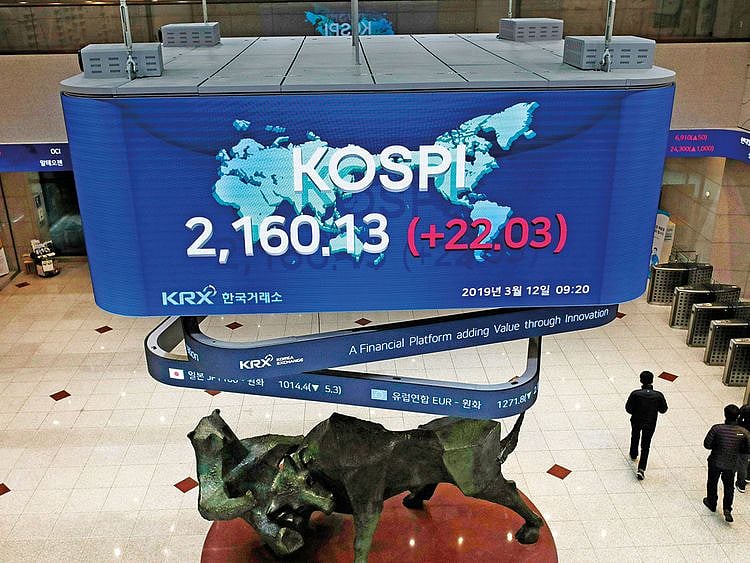Tech bulls return in Asia as trade talks take second place
Technology companies in the MSCI Asia Pacific Index rebound 20% from January low

Hong Kong
Tech is back, and it couldn’t have come at a better time for Asia.
With optimism for a quick US-China trade deal starting to fade as the two sides haggle over the specifics, stock markets in the region need all the help they can get to keep the good times rolling. And it’s tech again that’s coming to the rescue.
Technology companies in the MSCI Asia Pacific Index have led the charge this week, taking their rebound from a January low to 20 per cent. The sector is also back to being the biggest gainer for the year.
For its part, the Asia Pacific index is heading for its highest level since early October, on pace for a second weekly advance after a lull earlier this month. Japan eked out a gain as the market reopened following a holiday, while Chinese stocks recovered from earlier losses.
While tech is Friday’s highlight, investors are also still parsing the implications of the Federal Reserve signalling Wednesday that it will hold off on interest-rate increases this year, due to concerns about the slowing US economy. On the one hand, a weaker greenback is positive for emerging-market economies in the region, but on the other, a stalling US engine is bad news for global growth. The Fed’s more dovish stance does open the door for Asia’s central banks to potentially cut rates.
“For the rally to continue, the most important thing we’re watching for is whether the global economy starts responding to a mostly dovish Fed and ECB, and more stimulus from China,” Tai Hui, chief market strategist for Asia at JPMorgan Asset Management, said at a press conference in Hong Kong March 21. If PMI numbers “continue to stabilise and even pick up as we move towards the summer, I would think this rally can continue.”
Leading the way for tech, giant Samsung Electronics Co. and Taiwan Semiconductor Manufacturing Co., which collectively account for about a third of the MSCI Asia Pacific Information Technology Index, have advanced 4 per cent or more this week to join a wider rally in global chip stocks.
The sector jumped overnight in the US, driving a 3.5 per cent advance in the Philadelphia Semiconductor Index as it came close to the peak it hit a year ago. Micron Technology Inc, the largest US maker of computer-memory chips, reported quarterly results ahead of analysts’ estimates while also announcing plans to cut production in response to a slump in demand.
“While the production cut is not significant in absolute terms, we believe Micron’s action is positive for the memory industry as we expect it to lead to a market reassessment of the current concerns,” Peter Lee, an analyst with Citigroup Global Markets Inc, wrote in a note to clients.
The picture is a bit different for two of the most prominent Hong Kong-listed tech stocks, with both Tencent Holdings Ltd and Xiaomi Corp reporting a mixed bag of earnings this week.
Tencent, the most-valuable stock in the Hang Seng Index and biggest component of the MSCI Asia Pacific Index, fluctuated after posting a slump in fourth-quarter earnings on increased spending. Analysts kept an optimistic view, saying smartphone-games revenue is likely to accelerate and that the company can successfully expand beyond gaming and consumer internet.
Smartphone maker Xiaomi actually bested analysts’ forecasts, after raising retail prices, revamping its budget label and expanding overseas. But it hasn’t been enough to convince investors the company is on the right track as it’s still struggling to compete in China’s plateauing smartphone market. The stock posted a fourth weekly loss, extending its decline this year to 13 per cent.
Sign up for the Daily Briefing
Get the latest news and updates straight to your inbox
Network Links
GN StoreDownload our app
© Al Nisr Publishing LLC 2026. All rights reserved.